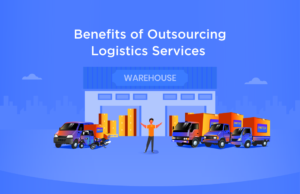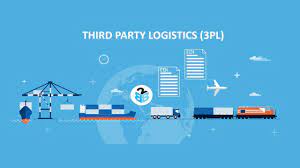A Comprehensive Guide to Understanding the Pros and Cons of Outsourcing Logistics Services
Logistics management is an integral part of any business, and outsourcing logistics services has become increasingly popular over the years. Outsourcing logistics services involves contracting a third-party provider to manage certain aspects of your logistics operations. While there are numerous benefits of outsourcing logistics services, there are also some potential drawbacks that companies should consider before deciding to outsource. In this article, we will explore the advantages and disadvantages of outsourcing logistics services.

Advantages of Outsourcing Logistics Services:
- Cost Savings: One of the most significant advantages of outsourcing logistics services is cost savings. By outsourcing your logistics operations, you can eliminate the need for a dedicated logistics team and the associated costs of hiring and training employees. You also save on the costs of maintaining and upgrading logistics equipment, such as transportation vehicles and warehouses.
- Access to Expertise: Outsourcing logistics services can provide access to a team of experts who specialize in logistics management. These experts can offer valuable insights and recommendations that can help optimize your logistics operations and improve overall efficiency.
- Flexibility and Scalability: Outsourcing logistics services allows you to adjust your logistics operations to meet changing demands and market conditions. This flexibility and scalability enable you to adapt quickly to changing business needs without having to invest in additional resources.
- Improved Focus: By outsourcing logistics services, you can free up valuable time and resources that can be redirected towards core business functions. This allows you to focus on your core competencies, such as product development and marketing.
Disadvantages of Outsourcing Logistics Services:
- Loss of Control: One of the main disadvantages of outsourcing logistics services is the loss of control over certain aspects of your logistics operations. When you outsource logistics services, you rely on a third-party provider to manage critical functions such as transportation, warehousing, and distribution. This can be challenging, particularly when it comes to maintaining quality standards and meeting customer expectations.
- Communication Issues: Outsourcing logistics services can lead to communication issues between your company and the third-party provider. These issues can arise due to differences in time zones, language barriers, and cultural differences, among other factors.

Source: Google Images - Potential Risks: Outsourcing logistics services can expose your company to certain risks, such as data breaches and security breaches. You need to ensure that the third-party provider has adequate security measures in place to protect your data and minimize the risk of cyberattacks.
- Dependency on Third-Party Provider: Outsourcing logistics services can create a dependency on the third-party provider. If the third-party provider fails to meet its obligations, it can have a significant impact on your logistics operations and ultimately, your business.
Factors to Consider When Deciding to Outsource Logistics Services:
When deciding whether to outsource logistics services, companies need to consider several factors, including:
- Cost: Outsourcing logistics services can result in cost savings, but it is essential to weigh the costs of outsourcing against the benefits. Companies need to consider the total cost of outsourcing, including the cost of the third-party provider’s services, the cost of transitioning to an outsourcing model, and any potential hidden costs.
- Service Level: Companies need to ensure that the third-party provider can meet their service level requirements. This includes ensuring that the provider has the necessary resources, expertise, and technology to manage logistics operations efficiently.
- Flexibility: Companies need to ensure that the third-party provider can adapt to their changing business needs. This includes being able to adjust logistics operations to meet changing market conditions, such as fluctuating demand or supply chain disruptions.

Source: Google Images - Technology: Technology plays a critical role in logistics operations, and companies need to ensure that the third-party provider has access to the latest logistics technology. This includes transportation management systems (TMS), warehouse management systems (WMS), and supply chain visibility tools.
- Reputation: Companies need to choose a reputable and reliable third-party provider with a proven track record of delivering high-quality logistics services. This includes conducting thorough due diligence, checking references, and reviewing the provider’s certifications and accreditations.
Best Practices for Outsourcing Logistics Services:
To ensure a successful outsourcing arrangement, companies should follow best practices when outsourcing logistics services. These include:
- Establishing Clear Communication Channels: Clear communication is critical when outsourcing logistics services. Companies need to establish clear communication channels with the third-party provider, including regular meetings, reporting requirements, and escalation procedures.
- Defining Expectations and Metrics: Companies need to define their expectations and metrics for outsourcing logistics services. This includes defining service level requirements, key performance indicators (KPIs), and metrics for measuring the success of the outsourcing arrangement.
- Maintaining Oversight: Although outsourcing logistics services involves delegating certain responsibilities to a third-party provider, companies should maintain oversight of their logistics operations. This includes conducting regular audits, reviewing performance metrics, and monitoring the quality of services provided by the third-party provider.

Source: Google Images - Continuously Improving: Outsourcing logistics services provides an opportunity for companies to continuously improve their logistics operations. Companies should work closely with the third-party provider to identify areas for improvement and implement changes to improve efficiency, reduce costs, and enhance customer satisfaction.
- Choose a reputable and reliable third-party provider: Before selecting a third-party provider, companies should research and evaluate potential providers carefully. This includes checking references, reviewing their track record, and assessing their capabilities.

Conclusion:
Outsourcing logistics services can provide significant benefits for companies, including cost savings, access to expertise, flexibility, and improved focus. However, it also poses potential drawbacks, such as loss of control, communication issues, potential risks, and dependency on the third-party provider. To maximize the benefits of outsourcing logistics operations, companies need to carefully consider the advantages and disadvantages of outsourcing, follow best practices when outsourcing, and continuously monitor and improve their logistics operations. By doing so, companies can optimize their logistics operations, reduce costs, and improve efficiency. By choosing a reputable and reliable third-party provider, establishing clear communication channels, defining expectations and metrics, maintaining oversight, and continuously improving, companies can maximize the benefits of outsourcing logistics services and optimize their logistics operations.



